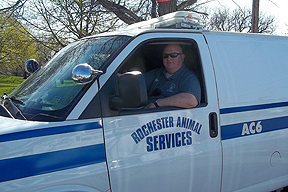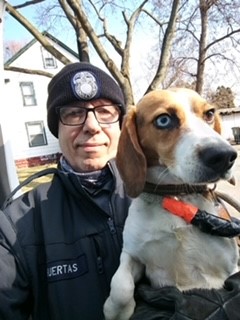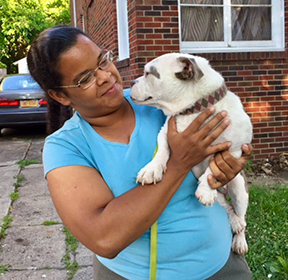 Our Field Services Unit is comprised of Animal Services Officers and Outreach & Support Specialists. Animal Services Officers (ASOs) play a vital role for people and animals within our community. Their job encompasses public safety, enforcement of animal ordinances, animal care and rescue, nuisance abatement, and community outreach and pet owner support. Outreach and Support Specialists focus exclusively on providing supportive services and referrals for community members facing barriers in access to resources.
Our Field Services Unit is comprised of Animal Services Officers and Outreach & Support Specialists. Animal Services Officers (ASOs) play a vital role for people and animals within our community. Their job encompasses public safety, enforcement of animal ordinances, animal care and rescue, nuisance abatement, and community outreach and pet owner support. Outreach and Support Specialists focus exclusively on providing supportive services and referrals for community members facing barriers in access to resources.
Offices are located at the Animal Services Center at 184 Verona Street. The center is open to the public seven days a week, 12:00 p.m. to 4 p.m. The shelter is closed on some holidays, as well as the third Tuesday of each month for staff and volunteer training. ASOs are staffed 9:00 a.m. to 5:00 p.m., 7 days a week, 365 days a year. During the hours of 5:00 p.m. to 9:00 a.m., ASOs may be called in for particular high-priority incidents. Outreach and Support Specialists also work primarily weekdays 9:00 a.m. to 5:00 p.m., with occasional weekend hours for community events. 
ASOs are dispatched through the Emergency Communications Department (911). Generally, there is one ASO assigned to the east side and one ASO assigned to the west side of the city. On days when there is a third and fourth ASO on duty, they are assigned to assist on both sides of the city and to perform pro-active outreach and support and other administrative duties. There are periodically days in which there is only one ASO on-duty, and on those days, the field services response may be limited to priority incidents.
Call 911 for the following animal concerns:
- vicious animals, animals chasing people
- animal/vehicle collisions
- animal fighting (Police Officers respond first) or other intentional abuse of animals
Call 311 for the following animal concerns:
- lost dogs - Can you help get the dog home? 311 or Animal Services representatives can provide guidance and resources if you have lost a pet or found a pet
- barking dogs
- trapped animals
- animals in distress
- animal bites and scratches that break skin; excluding bats (for bats, call Monroe County Health Department at 753-5171)
- removal of dead animal carcasses (request Special Services via 311 for routine dead animal removal).
Call the Humane Society of Rochester and Monroe County at 223-6500 for all non-emergency concerns related to animal neglect or animal cruelty
ASOs are often engaged in pro-active outreach to share information and provide support to pet owners in under-served neighborhoods. However, when not on pro-active details, ASOs are complaint-driven due to the high volume of calls for service they receive. All complaints received are provided with an appropriate response. ASOs prioritize their responses according to the safety issues involved for humans and animals. For example, an animal causing an immediate safety risk to a human would be the highest priority. Injured animals are taken next in order, followed by confined lost animals, unconfined lost animals, and lastly animal nuisances such as barking and sanitation complaints.
Dog Licensing
All dogs four months of age or older are required to have a dog license according to NYS Agriculture and Markets Laws Article 7. The Animal Services Center licenses all dogs reclaimed or adopted from that facility and others as services are provided. The City Clerk's Office licenses all other dogs residing with residents of the city of Rochester. Applications can be made at the City Clerk's Office at City Hall, 30 Church Street, Rochester, NY 14614 or by mail. New York State requires proof of current rabies vaccination to obtain a dog license. If the dog is spayed or neutered, documentation must be presented for the reduced license fee. To contact the City Clerk's Office call 428-7421. For residents of surrounding municipalities, contact your local town clerk for dog licensing guidelines.
Reasons to license your dog:
- Dog licenses are required by NYS and local laws
- It helps reunite lost dogs with their owners
- It lets people know that your dog is not a homeless stray
- Animal Services will call you or send a letter if your dog comes to the shelter wearing a license tag
- A license is proof that your pet has been vaccinated against rabies
- It is legal proof of ownership
- When found wearing its license tag, your dog will be cared for at the Animal Services Center for a longer holding period
- If your dog is found and in need of medical attention, the license may enable contact with you to approve emergency care
- License fees support Animal Services programs and operations including return of lost pets to their homes, animal care at the shelter, pet adoption, spay and neuter, and community outreach services
- Licenses are required for dog park registrations
Companion Animal Regulations
All dogs, cats, and ferrets four months of age or older must be vaccinated for rabies. All dogs four months of age must be licensed to an adult owner at least 18 years of age. Licenses are available at the City Clerk's Office at City Hall.
- All dogs must be leashed or confined to the owners property.
- Persistent, unprovoked howling or barking is a violation.
- Female dogs in heat must be confined.
- Any vicious or dangerous dog must be confined.
- Owners must not permit their pets to damage or defile any property other than their own. Feces must be removed by owners whether on the owner's property or that of another.
- Do not have more than four dogs within a house or apartment with three or fewer units. For properties with four or more units, the limit is one dog per unit.
- Do not bring animals to public special events, festivals, or fireworks displays. Events are fun for people but can be stressful and dangerous for pets:
- Dogs can overheat quickly due to ambient temperature and heat radiating from pavement; heat stroke can be deadly
- Dog pads can become scorched by hot pavement
- Water is not readily available; dogs may drink other hazardous liquids
- Dogs may encounter hazardous food items on ground
- Dogs may pose a tripping hazard for people
- Leashes can become tangled resulting in dog-dog incidents
- Dogs may become frightened by crowds, strollers, loud noises and may bite out of fear
Community Outreach & Support
Animal Services representatives engage in pro-active efforts to provide information and support to pet owners. Our ASOs engage in proactive patrols on a regular basis during which they visit neighborhoods and chat with citizens about their pets or their concerns. Door-to-door outreach activities occur in specific areas within under-served neighborhoods. This pro-active approach involves non-judgmental communication, building relationships, offering direct support, and sharing information to help owners keep their pets safe and secure at home. Such activities are routed in social justice as we are committed to helping removing geographic, socioeconomic, and racial barriers in access to pet resources.
Enforcement
We attempt to resolve most incidents with non-punitive measures so as to avoid punishing people for issues related to barriers in access to resources. However, some situations necessitate traditional enforcement. For such cases, ASOs issue Notices of Warning and Notices of Violation of the Code of the City of Rochester, Chapter 30 Animal Regulations and Chapter 31 Dog Control. Notices of Violation can be paid at the Parking and Municipal Violations Bureau at 200 E. Main Street, Suite B-001.
Download Animal Services Supporting Deposition form and instructions
Safety Tips
Do:
- Have all dogs, cats, and ferrets vaccinated against rabies.
- Avoid animals that are acting in an unusual manner.
- Teach children to stay away from wild animals, stray cats, and loose dogs.
- Wash all wounds with water and soap.
- Observe suspect animals from a distance.
- Try to contain an animal that bites you, if you can do so without endangering yourself or others.
- Call the Monroe County Department of Health at 753-5171 if you come in contact with the saliva of a suspected rabid animal.
Don't:
- Touch any dead animal with your bare hands. Wear rubber gloves if you must move it or place it in a trash bag.
- Touch a household pet with bare hands after it has fought with a wild animal. Do wear rubber gloves to examine your pet and wash hands afterwards with soap and water.
- Try to separate fighting animals with your hands. Instead, use a stick or pole to avoid getting bitten or scratched.
- Touch any wild animal.
What is Rabies?
Rabies is a fatal viral infection that affects the central nervous system. All mammals, including humans, can get rabies. The disease is spread by infected animals, usually through bites, but scratches and saliva contact with broken skin or mucous membranes are also possible routes of infection. If you see a suspected rabid animal that is not an immediate threat, or if you have any questions regarding rabies, rabies, vaccine, exposure treatment, or animal removal, call the Monroe County Department of Health at 753-5171.